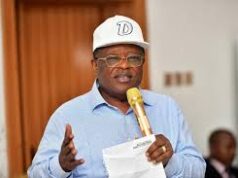
.An esteemed Power Systems engineer and researcher hailing from the United Kingdom, Pelumi Peter Aluko-Olokun, has passionately advocated for the implementation of cutting-edge grid technologies that foster energy reliability while expediting the transition to a net zero future.
Aluko-Olokun’s scholarly investigations concentrate on power system resilience, the integration of renewable energy sources, and the utilization of AI-driven innovations aimed at achieving grid stability and predictive maintenance. He unveiled alarming statistics surrounding electricity theft in Nigeria and its detrimental effects on the nation’s pursuit of energy sufficiency.
Delving into the widespread quandary of electricity pilferage in Nigeria and its ramifications for the nation’s energy domain, Aluko-Olokun observed that as twilight descends upon communities nationwide, countless families resort to generators. He remarked: “The usual rationale provided by the populace is the absence of light, but beneath that straightforward grievance lies a more intricate truth: much of Nigeria’s electricity fails to reach the intended recipients. It vanishes en route, siphoned off, squandered, or lost.”
Referencing data from the Nigerian Electricity Regulatory Commission (NERC), Aluko-Olokun indicated that Nigeria forfeits more than 40 percent of its generated electricity annually before it reaches paying customers. “Some of these losses stem from technical issues related to aging transmission lines, overloaded transformers, and dilapidated infrastructure, while a considerable fraction consists of non-technical losses, more bluntly identified as electricity theft, illegal hookups, bypassed meters, and unpaid bills. Collectively, these phenomena drain the power sector of billions of naira each year,” he elucidated.
Aluko-Olokun contended that this scenario undermines the capacity of Distribution Companies (DisCos) to recuperate expenses or invest in necessary infrastructure improvements. For conscientious consumers, the resultant effect is inflated tariffs, inconsistent supply, and escalating frustration.
The researcher documented the overt nature of power theft in numerous communities, explaining: “Residents illicitly connect wires directly to distribution lines, often with the tacit endorsement of unscrupulous officials. Prepaid meters are circumvented or manipulated. Entire neighborhoods enjoy “free electricity,” while others bear the financial burden.” His findings underscore that even some enterprises and government entities have been embroiled in these nefarious practices. In addition to lost revenue, he warned of other hazards: fires, transformer damage, and electrocution. Yet, for many Nigerians, power theft is perceived less as a crime and more as a necessity in a country plagued by unreliable electricity and erratic billing.
Aluko-Olokun’s research disclosed that, superficially, power theft appears to be a tactic for individuals to evade payments; however, the truth prevails that every Nigerian incurs the cost. “The losses permeate the entire system,” he emphasized, “DisCos transfer unrecovered costs to paying customers through elevated tariffs. The federal government compensates for a portion of the deficit with subsidies, depleting public funds that could have supported schools, hospitals, or road infrastructures. For businesses, the unreliability stemming from transformer failures and load shedding necessitates increased generator reliance. This amplifies production costs, making goods pricier for consumers. Thus, the concealed cost of power theft manifests in everything from bread to cement.”
According to Aluko-Olokun, “Mitigating power theft necessitates measures beyond mere punishment. Nigerians must recognize the value in paying for electricity. This requires metering every household, ensuring transparent billing practices, and providing a dependable supply. When people believe they are billed justly for their consumption, compliance escalates. Conversely, where service is subpar, theft flourishes. He accentuated the need for community engagement, imploring local leaders, traditional authorities, and civil society to assist in reframing electricity theft as not simply an individual advantage but as a collective detriment. More rigorous enforcement, augmented by smart technology like smart meters and remote oversight, could further curtail losses.”
Aluko concluded: “Nigeria’s electricity tribulation is frequently attributed to inadequate generation; however, even the modest amount generated is squandered before it reaches those in need. Until the hidden costs associated with power theft are adeptly addressed, an influx of megawatts will not automatically illuminate homes or empower industries. The reality is glaring: every stolen kilowatt keeps Nigeria in darkness. The choice confronting Nigerians is whether to continue paying the hidden cost in silence or to advocate for a power system rooted in equity, accountability, and shared responsibility.











